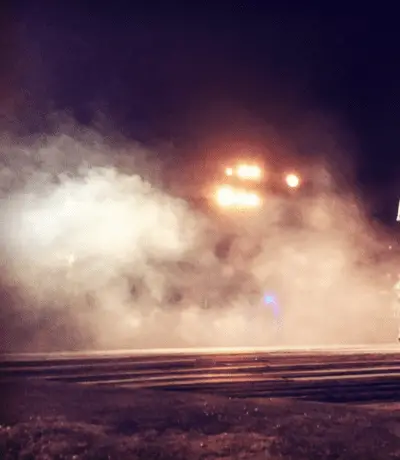Hear this story and more on our YouTube channel. For everything else horror, give us a follow on Twitter.
Benjamin Walker IV peered out through the curtains on stage right and was nervous for the first time in his storied career. I don’t get stage fright. The audience should be scared of me.
It was hard to keep that attitude in mind when the tunic under his clammy fingers was good silk and when the acoustics were so carefully calibrated that his earpiece picked up every tremble in Maggie’s voice when she called out for the gods to unsex her in Act I. It seemed that he had been preparing for some final performance for years as his joints began to stiffen and his voice began to take on a weariness that he had once affected when playing old men. Increasingly now that final performance seemed closer and closer on an imagined horizon, but sometimes the venues were good and the production quality rewarded the work, and then he could rekindle the joy that he had once thought he would never lose. But tonight a new Understudy had joined the cast, and a new shiver had run through him when he stepped onto the heath and heard her voice for the first time.
She was playing the Third Witch, and she was better than any Understudy he had ever worked with. Whoever had programmed Macbeth into her on short notice had done more than the bare minimum that Walker had come to expect; someone had really delved into the text and toyed around with those next-generation emotion circuits. The way she looked at him made him nervous. More and more, audiences were coming to shows that were advertised as having Understudies in the cast. It was rare for them to take on more than relatively small supporting roles; expenses for parts and maintenance and all that. Some companies didn’t even give them dressing rooms—they weren’t supposed to need such luxuries as time to prepare or get into the right head space, and most of them were put into makeup before they were sent to the venue. But everyone agreed that the illusion was better if you could treat them like real people, even if they weren’t supposed to care.
“I love intermission.” She was suddenly behind him, watching him watch the audience.
Her eyes were dark brown. Walker had been afraid to look into them at first, afraid of the tiny telltale red lights that Understudies had built into their pupils to make sure there was no confusing them with starry-eyed ingenues. The story went around that a young lothario had assumed an artificial human to be so single-mindedly focused on the programmed script that they could be . . . explored backstage. His eviscerated body had been found in a props locker, his eyes gouged out with his own severed fingers.
“I was sorry to hear about Nora,” said the Third Witch. “I hate getting a job at someone else’s expense. I know the two of you were close.” She cocked her head slightly to the left, the way Nora herself did sometimes, and Walker saw the faint blue of an artificial vein tint the pale skin of her neck. He felt suddenly judged. Nora had judged him too, teased him in the dark backstage, told him he was getting too old for someone like her. When the Understudy had first been introduced to the cast he had felt a strangely cathartic rush of joy—it had looked different and yet somehow familiar, like her, and he had almost said You came back.
Walker stepped back out from the curtain and adjusted his tunic. Attention to detail—that’s what separates the professionals from the amateurs. But there was such a thing as too much detail.
“Yes,” he finally said. “We did a lot of shows together. Her illness was a shock.”
The Third Witch smiled. “I hope we can be close too. This is a long tour.”
“Yes. It is. You’re right. I—I hope so too. What is it, like ten minutes to places?” He gave a clumsy half-bow, the kind that would have looked stupid onstage or off, between real people or artificial ones, and slipped into his dressing room to go through his dumb little rituals.
The technology was always improving, and the technicians claimed that the newest model could finally recreate the trickier emotions: anxiety, jealousy, regret. The ones that looked different on the outside from the way they felt on the inside. Like everyone who had been in the business since the old days, Walker was both impressed and nervous about it all. It was still fun to start work on a show with a new group of people who might make a mistake or have their own take on the material. When Nora had joined the company Walker had felt that unexpected joy, the rush that came from having to adjust to someone who was not only their own person, separate from the energy the show had already produced, but also unpredictable. Nora had been known to drop a line here and there, and after her last ad-lib-heavy performance, right before she had become sick, the two of them had laughed together over a bottle of rum passed back and forth, looking up at the stars in the parking lot behind the theatre.
But Understudies were programmed to do it right, not to do it new. The Stage Manager comm in his earpiece called “places,” and Walker knew he had a few minutes while the three witches put their dark brew together at the top of the act. He heard a smattering of applause and then the first lines into his right ear. “Thrice the brinded cat hath mewed.”
The most important lesson he had learned was that no matter how well or how badly you might be doing, the other actors were not thinking of you. Even if you made a mistake, their attention would always be on their own part in making it right. That was what he had loved about working with Nora: they had felt free with one another, and their mistakes became part of the story they were telling each night.
I know the two of you were close. What else did she know about them? He closed his eyes to get into character, but saw there only her eyes—no, not her eyes but the other one’s.
Suddenly, loud in his ear: “By the pricking of my thumbs—” and he was up, scrambling, remembering as he always did here that there really HAD been people who believed in gods and devils once upon a time. In those days people had learned their lines by candlelight, and the verses on the page had conjured up specters and shadows that lingered in the dark corners of their timbered rooms when they finally crept into their tiny beds, too unnerved to sleep. No wonder they wrote dark plays back then.

How now you secret black and midnight hags How now you secret black and midnight hags What is’t you do What is’t you do
But instead, as he slithered in from the wings and the eerie green lights hit him, he saw the red glint in the Third Witch’s eye and felt suddenly seen and understood, all his secrets carved away.
“Now you secret hags of black! What shall I do?”
The First and Second Witches did not acknowledge the mistake. What difference is it, after all, to ask what YOU do versus what I shall do? The show must go on. But there was a half-second in which to consider their response to his flubbed line, and in that dark empty moment the Third Witch’s red eye glittered at him and she alone spoke the line that they should have said in unison:
“A deed without a name.”
And suddenly Walker understood why Nora’s illness had been so sudden and why every day there seemed to be fewer and fewer old actors complaining about their Understudies. He felt the red eye crawl over his face, silently berating him for his mistake, and he realized that he and the Third Witch would not be watching the stars together after the show.


